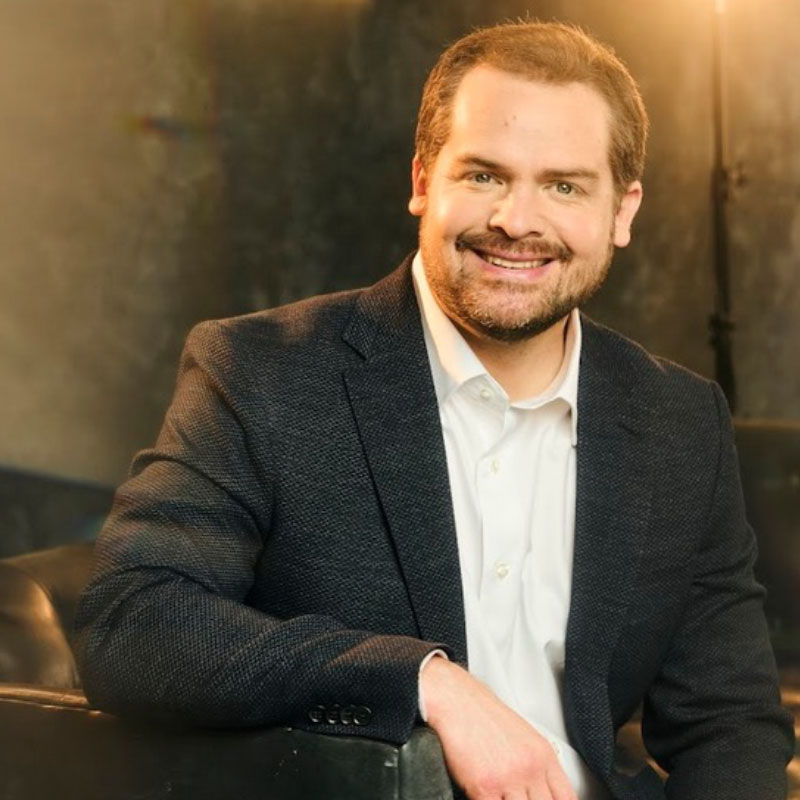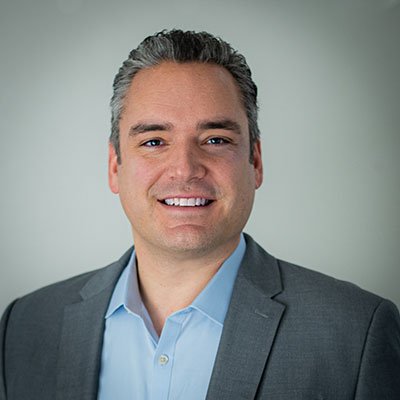Share This:

“One thing the Medicare does a good job of is making it complicated, and frankly, that's why I think that the need for a trusted source has never been higher. If you put yourself in the shoes of someone who's turned 65, they don't know where to turn. Why? Your phone's ringing off the hook. People are calling you like crazy. Your mailbox is getting flooded with stuff. Agents and agencies are reaching out to you.
I say the most important thing first and foremost, is just go to a source that you trust. Whether that source is someone on YouTube, whether that source is your trusted insurance agent that you already work with, whether that source is your financial advisor who you trust with your wealth, and they also can help you with your health, whether that source is The Matt Feret Show, whatever that source is. I think that's the biggest thing.”
- Bryan Derheim, Vice President – Medicare Senior Product Sales & National Accounts
Bryan Derheim is a Medicare insurance insider who has spent more than fifteen years in and around the Medicare Advantage, Medicare Part D and Medicare Supplements, also called Medigap insurance space.
This episode will give you an insider’s view into the differences between Medicare Advantage and Medigap plans, why what state you live in can determine the amount of coverage a Medicare Supplement plan can give you, unknown, little-thought-of gaps in Medigap coverage and how dental insurance, vision, hearing and other types of insurance and other plans play into your Medicare health insurance equation.
Listen to the episode on Apple Podcasts, Spotify, Deezer, Podcast Addict, Stitcher, Google Podcasts, Amazon Music, Alexa Flash Briefing, iHeart, Acast or on your favorite podcast platform. You can watch the interview on YouTube here.
Brought to you by Prepare for Medicare – The Insider’s Guide book series. Sign up for the Prepare for Medicare Newsletter, an exclusive subscription-only newsletter that delivers the inside scoop to help you stay up-to-date with your Medicare insurance coverage, highlight Medicare news you can use, and reminders for important dates throughout the year. When you sign up, you’ll immediately gain access to seven FREE Medicare checklists.
Quotes:
“It's kind of a recognition of the moment that this is really difficult to do on your own. It really comes down to finding a trusted source. And so, I think, in our current environment, having a trusted local Medicare agent that knows your state laws through and through, knows your instances, has served many folks in your community before, that have been in the same situation that you have been, because every situation is different.”
- Bryan Derheim, Vice President – Senior Product Sales & National Accounts
“Another thing that can really affect (Medicare Supplement) pricing is what state you live in. Every state is managed by a DOI, Department of Insurance, and they dictate and set the rules of how Medigap plans are going to work in their specific state. And for states that are more open for consumers, and have options to say, switch their plans every single year, versus states that are more restrictive, and those same options don't exist, that can lead to different pricing. And if a state does, I'll call it, more restrictive for the consumer, what that does mean, generally, is that price is actually a little bit lower. And if the state gives a consumer more rights around (Medicare Supplement) Guaranteed Issue and have other things that are tilted more in the benefit of the consumer, that also is generally reflected in the premium, and those states will have a little bit higher premiums.”
- Bryan Derheim, Vice President – Senior Product Sales & National Accounts
#016
Selected Link from the Episode:
Full Show Transcript:
00:00:00 / 00:41:19
LEGAL CONDITIONS:
Matt Feret/MF Media, LLC owns the copyright all content and transcripts of The Matt Feret Show, and themattferetshow.com with all rights reserved, as well as right of publicity. All rights reserved.
No part of this publication may be reproduced or transmitted in any form or by any means, electronic or mechanical, including photocopying, recording, or by any information storage and retrieval system without written permission of the publisher, except for the inclusion of brief quotations in a review. You are welcome to share the below transcript (up to 500 words) in media articles, on your personal website, in a non-commercial article or blog post, and/or on a personal social media account for non-commercial purposes, if you include attribution to “The Matt Feret Show” and link back to the themattferetshow.com website.
WHAT IS NOT ALLOWED: No one may copy any portion of the content or use Matt Feret’s name, image or likeness for any commercial purpose or use, including without limitation inclusion in any books, e-books, book summaries or synopses, or on a commercial website or social media site (e.g., Facebook, Twitter, Instagram, etc.) that offers or promotes your or another’s products or services.
DISCLAIMER: This publication is in no way sponsored, associated, authorized, approved, endorsed nor, in any way affiliated with any government agency, company, trademarked names, or other marks. Any such mention is for purpose of reference only. Any advice, generalized statistics, or opinions expressed are strictly those of the host and the guest. This publication, The Matt Feret Show nor The themattferetshow.com website is meant to replace the sage advice of healthcare, insurance, financial planning, accounting, or legal professionals. You are responsible for your financial decisions. It is your sole responsibility to independently evaluate the accuracy, correctness or completeness of the content, services, and products of, and associated with this publication. The thoughts and opinions expressed in this publication are those of the host and guest(s) only and are not the thoughts and opinions of any current or former employer of the host and guest(s) nor is this publication made by, on behalf of, or endorsed or approved by any current or former employer of the host and guest(s).
Matt Feret (00:02):
Hello everyone. This is Matt Feret, author of the Prepare for Medicare book series and welcome to another episode of The Matt Feret Show, where I interview insiders and experts to help light a path to a successful retirement.
(00:17):
Say hello at www.themattferetshow.com for YouTube videos, show links, notes, websites referenced, quotable quotes, and the complete show transcript. I just released the second edition of my bestselling book, Prepare for Medicare, The Insider's Guide to Buying Medicare insurance. It's the 2022-2023 version, and I made over 150 edits to the book to bring it up to date, and to get you ready for all of the changes being made to your Medicare coverage. Make sure to check it out on Amazon.
(00:52):
To help celebrate the second edition, I spent some time with one of my Medicare buddies, Bryan Derheim. Bryan's been around the Medicare insurance space for almost as long as I have, and you can tell, we jump right into it. We both nerd out on Medicare Advantage, Medicare Part D, and Medicare Supplements also called Medigap insurance.
(01:11):
Side note, do you know what a missing tooth clause is? I didn't either until now. This episode will answer that question, but more importantly, give you an insider's view into navigating Medicare insurance options, comparing Medicare Supplements to Medicare Advantage plans, types of insurance not everyone talks about like dental insurance, vision insurance, hearing insurance, cancer policies, and a whole lot more. Enjoy.
(01:37):
Bryan, welcome to the show.
Bryan Derheim (01:39):
Hey, thanks so much, Matt. I'm super excited about this and I appreciate you having me on.
Matt Feret (01:43):
So tell everybody watching and listening what you do and why you're here.
Bryan Derheim (01:48):
Yeah, so I'm Bryan Derheim. I've spent the last 15 years of my life in and around the Medicare and the senior market more broadly, and so in all various capacities, but I currently work for a real large insurance company that focuses in on Medicare Supplement, and then we have a host of supplemental plans that go alongside that Medicare Supplement plan, like dental vision, hearing, hospital indemnity, those sorts of things.
Matt Feret (02:12):
I know the main senior products and you know the main senior products, but I'll repeat them. So you've got Medicare Advantage. You've got Medicare Part D and you've got Medicare Supplements, and those are three things I cover pretty extensively in my book, but there are other quote-unquote senior older adult-based products that are out there that don't get talked about a whole heck of a lot. What are those?
Bryan Derheim (02:33):
Yeah, sure. So most of my focus is in one of the three you mentioned, which was Medicare Supplement, but then outside of that, the more directly answer your question. We offer a host of different ancillary plans as I call them or some refer to them as supplemental plans. So examples of those would be a dental vision and hearing, which is a real common one, especially with those that are purchasing Medicare Supplement, because it's the primary thing that the original Medicare does not cover.
(02:58):
Hospital indemnity is another one. If someone is purchasing a Medicare Advantage plan and they're looking to cover their copays, and generally just their out of pocket expenses and their deductibles when they go to a hospital, you can purchase something called a hospital indemnity plan that would help pay for that.
(03:11):
And then after that, there's a long list of them. There's critical illness, there's accident plans to some degree, really, and it seems like every year that goes by that list gets longer, longer, just depending on the needs that we've see in the marketplace.
Matt Feret (03:27):
Dental, vision, hearing, that sounds like a bundled product. Are they separate or are they bundled?
Bryan Derheim (03:33):
Just depends on the carrier and who's offering it. Frequently, they're bundled, but some carriers will give you the option to buy them individually or do purchase them with riders so that you can buy the dental plan as the core product. But then if you want to purchase vision, you can. If you don't want to purchase vision, you don't have to, it just depends on what carrier you and your agent are specifically looking at.
Matt Feret (03:56):
Let me pivot immediately into Medicare Supplements.
Bryan Derheim (03:59):
Sure.
Matt Feret (03:59):
So you primarily work with Medicare Supplements, correct?
Bryan Derheim (04:04):
I do. Yep.
Matt Feret (04:05):
Okay. So let's talk about those for a little bit. Medicare Advantage is one option, Medicare Supplement plus a Medicare Part D prescription drug card is another option. Talk to me about Medicare Supplement plus Part D. We all know, or we've all heard about Medicare Advantage and the popularity that's enjoyed, I guess you could say over the years, but Medicare Supplement is still a very valid way to go get Medicare insurance and cover yourself. Why would someone think about a Medicare Supplement route over a Medicare Advantage route?
Bryan Derheim (04:42):
You're right, Matt. Over the last I'll call it five or 10 years, Medicare Advantage has grown tremendously. The popularity of those plans continues to increase. It seems as though the additive benefits within those plans, the fact that there's zero premium for the cost of the plan itself, and all of the commercials that we all see related to these plans has definitely driven the popularity of them.
(05:06):
But many folks will be swayed one way or the other just depending on the agent's preference, and so I'm glad you brought up Medicare Supplement because it's definitely a viable, alternative to Medicare Advantage. The reason why someone want to look at a Medicare Supplement plan with the prescription drug plan in conjunction with it is really for those that are valuing choice. When you purchase any Medicare Supplement product to go alongside of your original Medicare or your red or white and blue card, it ultimately gives you the opportunity to go to any doctor that you want that accepts Medicare.
(05:39):
And so you're not a part of a network. There's no referrals that are needed, anything of that sort, and usually the Medicare Supplement product, depending which one you purchase will either come with essentially no out of pocket expenses or very little out of pocket expenses.
(05:54):
And so while you have to pay the premium for these plans and the plans range, depending on where you live and what plan you're looking at, but they can be as low as $50 a month to upwards of 200, $250 a month. So they range greatly, but it gives you consistency in terms of budgeting and preparing for what your health expenses are going to be throughout retirement.
Matt Feret (06:15):
I put in my book, and I think I know this just from my experience, at this point if you are just now getting the point where you're taking Medicare and you were born after the first of the year 2020, Plan G is the most comprehensive, would you agree?
Bryan Derheim (06:31):
Agreed.
Matt Feret (06:32):
And right behind that Plan N?
Bryan Derheim (06:34):
Correct. Yeah.
Matt Feret (06:35):
Beyond that, there are a lot of other letters that can be confusing, and one of those letters, or one of those plan designs is actually a high G and those can come with those premium amounts of 40, 30, $50 a month. Can you talk about what someone would like to consider about a high deductible Plan G Medicare Supplement, and how that would factor into their healthcare decisions when they're weighing MedSupp versus Medicare Advantage. There is another asterisk isn't there around Medicare Supplement around the high deductible Plan G.
Bryan Derheim (07:08):
It's a great point. It's probably something that's not spoken enough about, frankly, and I'll call it an in between solution between Medicare Advantage with generally no premium or low premium expense, but with network and a deductible and copays versus MedSupp, which is I'll call on average 150 bucks a month, but virtually no out of pocket expense, very little.
(07:35):
The high G can become that in-between solution where you still get the benefits of no network that original Medicare or Medicare Supplement provides, but there's a little bit higher of a deductible that sits in between. So instead of 200 and some dollars for deductible, you might be closer to about roughly $2,000 for that deductible, but you still get the benefit once again of not having a network.
(07:57):
So for folks that maybe are a little bit healthier and they're okay with a couple thousand dollars deductible, but they want the ability to go where they would like, especially when it comes to specialty care they want.
(08:07):
I'm in Minnesota. As I mentioned earlier, there's folks in Minnesota like, hey, if I get cancer, like the plan is I'm going straight to Rochester, Minnesota, and I'm going to go to Mayo. You have that opportunity when you're on original Medicare with some sort of supplement plan. That is technically still possible with Medicare Advantage, but you're just going to have to navigate the network, and you're going to have to understand who's in network and who's not in network and just work through that process ultimately.
Matt Feret (08:37):
How do you go about assessing? I mentioned Plan G. High G, we just talked about and then plan N and then again, if you were born before a certain date or no, sorry, eligible for Medicare before January 1, 2020, you've got Plan F, Plan C. I mean, there's a lot of letters flowing around. If you're thinking about somebody trying to figure this out for the first time, where do you start in this alphabet soup? I know that's an overused phrase, but how do you go about assessing which one might be the right plan For you?
Bryan Derheim (09:06):
It's easier said than done. One thing the Medicare does a good job of is making it complicated, and frankly, that's why I think that the need for a trusted source has never been higher. If you put yourself in the shoes of someone who's turned 65, if I'm in that spot, when I'm in that spot, I'll use my Dad as a more direct example. He's very soon going to be in that spot. They don't know where to turn. Why? Your phone's ringing off the hook. People are calling you like crazy. Your mailbox is getting flooded with stuff. Agents and agencies are reaching out to you.
(09:45):
In some instances, carriers are reaching directly out to you, and to some degree, because Medicare as a overall topic can be so complex, let alone just Medicare Supplementing your question of like, which plan makes sense for you. It's a lot. And you need to be certain that you're making the right decision.
(10:05):
I say the most important thing first and foremost is just go to a source that you trust. My Dad's going to, of course, come to me. Whether that source is someone on YouTube, whether that source is your trusted insurance agent that you already work with, whether that source is your financial advisor who you trust with your wealth, and they also can help you with your health, whether that source is The Matt Feret Show, whatever that source is. I think that's the biggest thing.
(10:31):
Because once you know you're working with someone that has your best intentions at heart, the rest can come. But until you know that point, you don't know the motives. You don't know the incentives of individuals, and it can be difficult at times to decipher if what you're hearing is actually right for your specific situation.
Matt Feret (10:52):
Makes a lot of sense, thank you. Medicare Advantage, and this is a bit of a compare. I guess Medicare Advantage has something called a MOOP. It's a maximum out of pocket, and it's on the medical side.
Matt Feret (11:00):
Something called a MOOP. It's a maximum out of pocket. It's on the medical side. And the MOOP is essentially, "Hey. If you have the worst health year ever, you go skydiving, your parachute doesn't open, you hit the ground, but you survive, but you bounce, and you're in the hospital, in and out, in and out, in and out. You got to 2 million worth of medical bills..." But there are limits, essentially. If you have a really bad health year, at some point, during the year, the Medicare Advantage plan says, "All right, that's it. Time out. For medical, you're done."
(11:29):
I know the advantage on Medicare Supplement up front is limiting that. So for example, Plan G, all you're really on the hook for is your Medicare Part B deductible, and then after that there's this sense of, "You're done."
Bryan Derheim (11:44):
Right.
Matt Feret (11:44):
My question to you is, but are you? Because, in some instances, I mean Medicare obviously has limits, original Medicare, in that it doesn't have a MOOP. You can technically spend your entire life savings away, if you have a really bad health year, and are in the hospital for literally years. You could. There's no max, and then Medicare supplements are supposed to fill in those gaps. Are there scenarios that are just not well known, by the general public, where you actually could run out of benefits, if you are on a Medicare Supplement?
Bryan Derheim (12:18):
The answer is yes. The one thing that comes most common is related to skilled nursing. Medicare, Medicare Supplement is not long-term care. Right? And so you get a hundred days for SNF, as it pertains to original Medicare, Medicare Supplement, and that's supposed to help with that transition. But it's, once again, it's not long-term care, and so I think the point that you made in your question is positive. I mean, it's a good one, in the fact that there can still be expenses that are outside of the scope of Medicare, and thus outside the scope of Medicare supplement, that one could occur related to their health, that doesn't completely cover them financially. And so, it kind of comes back to going to a source that you trust, and a source that has education around these topics, so they can lay out kind of all scenarios, and you can fully understand what it does cover, and what it ultimately doesn't cover.
Matt Feret (13:11):
Yeah, so part of that I would imagine is scenario planning. Worst case, best case. It's almost like financial. My financial planner, I'm not one, but my financial planner kind of goes, "Plan for the worst, expect the best." That old silly saying.
Bryan Derheim (13:24):
Yep.
Matt Feret (13:24):
But it does make sense. What other gaps, if there are gaps in there, in meta gap coverage? How about acute care? Say you're in the hospital. You know, you bounce out of that airplane and survive, but you are also in the hospital, literally in an acute care hospital, or an acute rehab hospital for two years.
Bryan Derheim (13:44):
Yeah.
Matt Feret (13:44):
Do you run out? What happens?
Bryan Derheim (13:47):
Yeah. So there's limit on hospital days. Right? So in each year, benefit period year, you get 90 days in the hospital, that ultimately would be covered between original Medicare and then the Meta Gap Plan. And then, there's something that's called your Lifetime Reserve, and there's additional 60 days that are available there.
(14:03):
But similar to skilled nursing, it's not something that goes on in perpetuity. Right? And so, there are a couple different ways that you can run out of coverage, if you will. And so it's important that, when you're purchasing these plans, and you're looking at something like a Meta Gap, and you hear someone ever say the words, "Well, Meta Gap covers everything that the original Medicare doesn't cover," that's technically a true statement, but it's only to some degree. You kind of need to understand the full picture.
(14:30):
And once again, if I think through two big things I hear about in the industry, where people can run out of coverage, and be on what would be considered Platinum Choice of insurance in a Meta Gap, it's those two. It's skilled nursing facilities, and then running out of hospital days, ultimately.
Matt Feret (14:46):
Tell me about prices, and price increases. With Medicare Advantage, again, this is a bit of a comparo, so with Medicare Advantage, if you're on a particular Medicare Advantage plan that's 20 bucks a month, you can be 65, you can be 105. It's still 20 bucks a month. But that's not always the case with Medicare supplements.
(15:07):
So when someone is, let's say, turning 65, or still working and now going to take Medicare Part B after 65, what kind of pricing tricks or gimmicks? I probably shouldn't use those two words, but are there introductory pricing? I mean, when you go to the Gap store, they are the 99 cent flip flops up front. We know they're not 99 cents, but when they want to get you in the store...
(15:33):
Is there some sort of introductory pricing, in Medicare supplement land, that you need to be cognizant of? Are there discounts that you should ask for, that you don't get unless you ask for them? I mean, what's that whole, if I'm turning 65 or newly eligible to Medicare, what are the kind of tips and tricks in there I need to know about, when thinking about buying a Medicare supplement or Meta Gap Plan?
Bryan Derheim (15:56):
Our discounts are ultimately available. The discounts do vary by carrier, depending on who you and your agent are ultimately considering. But more broadly, I guess what I would say, Matt, would be it's cheaper to insure an individual when they're young and healthy at age 65, versus when they're 95. And so, therefore, you should ultimately expect, on a Meta Gap plan, for the price to increase over time.
(16:23):
What I typically see most carriers do is they increase the premium roughly 3% per year, purely due to age. As the cost of claims continue to rise due to age, expect the premium to somewhat kind of follow, lockstep. When you think about, "Well then why does it not work that way with Medicare Advantage?" It does, you're just not seeing it. With Medicare Advantage, there's a certain stipend, I'll call it, that is received by the plans, and the age, and ultimately the health of that individual dictates how much that plan is actually receiving on the backend, to cover the cost of the health for that individual.
(16:59):
And so, it's behind the scenes, thus you don't see it upfront with your $20 a month premium, whether you're 65 or 85. But ultimately, the cost of care is different, by age. And so, that does influence the price on your Meta Gap policy.
(17:14):
Furthermore, another thing that can really affect the pricing is what state you live in. Every state is managed by a DOI, Department of Insurance, and they dictate and set the rules of how Meta Gap plans are going to work in their specific state. And for states that are more open for consumers, and have options to say, switch their plans every single year, versus states that are more restrictive, and those same options don't exist, that can lead to different pricing. And if a state does, I'll call it, more restrictive for the consumer, what that does mean, generally, is that price is actually a little bit lower. And if the state gives a consumer more rights around guaranteed issue, and have other things that are tilted more in the benefit of the consumer, that also is generally reflected in the premium, and those states will have a little bit higher.
(18:02):
And so, we have some instances we've seen, where you have a, Missouri and Kansas are a great example. You've got an MSA in Kansas City. It's the same MSA, but overlaps the two states. How Kansas and Missouri work and treat the rules around Meta Gap are drastically different, and so when I look at prices between those two states, even in just the same MSA, which theoretically should be kind of the same cost of care, I'll say. I see price differences in a monthly basis, anywhere from $50 to $70 a month. So it can be pretty drastic.
Matt Feret (18:35):
So across the state line, Person A, same age, same sex, same non-smoking status, same health status. Person B, $70 more a month.
Bryan Derheim (18:45):
Yep. Yep.
Matt Feret (18:46):
That's crazy.
Bryan Derheim (18:48):
But completely different rules. Right?
Matt Feret (18:51):
Yeah.
Bryan Derheim (18:51):
And while that $70 a month is more expensive, of course, they also are getting a lot of benefit, that they probably aren't realizing, but they're getting a lot of benefit versus that person that's paying 70 bucks less. So just different rules, and states a really unspoken thing about it.
Matt Feret (19:05):
And I've got a couple of blog posts up on the Prepare For Medicare site, that talks about the different state rules, and it's even in the book as well. And by the way, those get updated, what? About once a year? We just had a couple of new states start new rules. Illinois? Right? Which ones am I missing? I know Illinois was one.
Bryan Derheim (19:23):
Yep. Illinois, Idaho and Nevada are the three that changed this year.
Matt Feret (19:28):
And that's not a federal thing. That's a state by state thing. So the people who live in those states have new or different options, that are literally, it could be different across the state line.
Bryan Derheim (19:40):
Matt, it is different by state by state line, and my expectation going forward is you're going to see more states emulate some of these other states, like California, Oregon, Missouri, that have these annual GI rules.
(19:54):
Why? Because with Medicare Advantage, they have the opportunity for an annual switching period, all through a guaranteed issue. There's some states that do that on Medicare supplement. There's some states that do not. Over the last, I'll call it five years, there have been more states that have adopted comparable rules. So my personal expectation is that's going to be something that you're going to see more and more states do, slowly over time.
Matt Feret (20:17):
That makes a lot of sense. You're right, because I would say the majority of states don't allow you to switch. And that's one of the issues that you run into, is that if you don't pick up, in some of these states, a Medicare Supplement in your Medicare Supplement open enrollment window, and you turn seventy, and you're like, "Oh, now I want a Medicare supplement," a lot of these states it's too bad. Or, "No, we'll do it, but we'll have to ask health questions. And if you had any major, or even some minor health conditions, you're not going to get it." Which is way different than Medicare Advantage. Yeah.
Bryan Derheim (20:46):
Absolutely. Absolutely. Keep in mind, once again, there's generally no move. There's not much in terms of bottom of pocket expense. Pay your premium, and generally just about everything else is covered. Right?
(20:55):
And so, when it's difficult, on the insurance side, when someone wants to go to, I'll call it the Cadillac Insurance, as they get a little bit older and they're generally a little bit less healthy, [inaudible 00:21:06] just kind of jump on real quick. Right? That's a difficult business model on the carrier side to do, and so there's checks and balances there. But I think at the end of the day, giving Medicare beneficiaries a choice, to get in the best plan for them, is going to be something that is going to continue to improve upon. I think it's something that'll continue to increase as we go over time. So I'd expect once again, more states to start to adopt that over time.
Matt Feret (21:29):
I noticed on, let's just say Medicare.gov, where a lot of people go to do research, you can find a Medicare Part D plan pretty easily. You can enter your drugs in. You can find your local pharmacy, hit click, and it spits out all the plans, and all the prices. And you can also do the same thing for Medicare Advantage. You can type in your zip code. You can type in your drugs. You can't type in your doctors. That's a major, major, major frustrating flaw. Medicare supplement page? You click on find a Medicare supplement, and all it-
Matt Feret (22:00):
Medicare supplement page, you click on find a Medicare supplement and all it does is list all the supplements are available in your state and their websites. There's like zero interaction right now. For the consumer, do you see that changing at all?
Bryan Derheim (22:14):
That's a great question. I can't say I've got any sort of insight on whether that's going to change, but just my personal belief that it should change. Frankly, I think out of everything you just listed that they're already doing, they kind of tackled some of the harder pieces already. And I kind of look at Metal Gap as an opportunity for, I think you can get the level of education to a consumer at a much further point with something that's standardized and consistent, like Metal Gap plans. And F is an F, a G is a G. And so once you understand the basics of Medicare and how Metal Gap plan works with original Medicare, it actually can become pretty simple once you can get past that initial hurdle.
(22:52):
And so I still would like to see our industry make a lot of improvements around how much we can deliver up directly to the consumer. And I think it's needed on all facets of Medicare, but I believe in my opinion, the easiest spot to start are the standardized options where everything is consistent, and that's Meta Gap. And so frankly, until you posed that question, to me, it didn't even really kind of dawn on me that there's actually more information on what is arguably the kind of more complicated products vis a vis less information on the simpler products.
Matt Feret (23:27):
Yeah. Yeah. I mean, it's amazing to me, and it's almost like you could Google Metal Gap in my state and come up with the same results that's on medicare.gov. It's just links to websites. So if I'm trying to DIY this thing, how do I do it? If I say, "Yep, I got it. I know what I'm doing. I want a Metal Gap Medicare supplement, and I'm going to get a part D card. I'm going to go do my part D card on medicare.gov. And I want to go get my own Medicare supplement plan. I want to see them all. I want to see them side by side just like I think I can on medicare.gov." How do I do this? What do I think about when I'm trying to shop? Because if I find there are 15, 20 Metal Gap Medicare supplement carriers in my state, do I really have to go to all their websites? Do I call them? How do I DIY Metal Gap and Medicare supplement?
Bryan Derheim (24:19):
From my perspective, that's still an area of the Medicare market that's broken. I've yet to see a really simple, easy solution where I can DIY your own way through it. I believe it should exist. I just don't see the market there yet. At least I haven't seen anyone that's doing it in a way where I'm like, that's easy. That makes a complicated, simple. If you want a DIY, go this route. I haven't seen that yet. I think that still needs to be created. I think with Medicare being so complicated, that's a much easier thing for me to sit here and say should be done than what it is in reality, but I've yet to see it.
(24:56):
And so therefore, what do you do in your instance? I think what you do is you arm yourself with information. There's a ton of information. As you continue to go through the space of Google on Medicare and Medicare supplement. There's many YouTube videos on it, way more than what there was 10 years ago.
(25:11):
And so I think you'll likely eventually be led to a conversation with an insurance agent about picking what's best for you, but going into that conversation can be way different than what it was 10 years ago. Just purely with the amount of information that's available to you. And so you could set that conversation of, "Hey, I've done all of my research. This is my situation. Based upon my research, my understanding is I want to proceed with getting on part A and B and then purchasing the plan G Metal Gap plan."
(25:42):
And if you make it as simple as that, and the agent agrees with your assessment and your conclusion, it can be a very quick conversation and painless process from a purchasing perspective then thereafter, but be able to do that from beginning to end, kind of purchase it all in your PJs, on your iPhone at the end of the day. I don't think we're there yet, in my opinion.
Matt Feret (26:08):
So use an agent, prepare for an agent, and show up and say, "This is what I think. What do you think? I've done all my research. I've done all my homework. I've read the books. I've done all the 'YouTube research.' And I think this is what I do." And then ask the insurance agent what he or she thinks. That's how to DIY it at this point.
Bryan Derheim (26:30):
I would say so. Yeah. And I also wouldn't over, how do I say it? Because every situation's different, that agent might be aware of something that you're not seeing via Google. That agent might be aware of a state law that you're not aware of, because lot of the information that's out there is generalized. It's somewhat nationwide. And if you live in New York boroughs for example where the state rules are completely different in New York compared to Iowa. It doesn't matter how things work in Iowa. That's not applicable to you. It matters how does things work in New York? And that agent, especially if they're a good agent, they're going to know that information. They're either going to be able to affirm your conclusion or kind of help you understand some of the gaps, but either way that research, I think will prove to be valuable for you, because it'll make you feel more confident in that decision. Getting on a Medicare, doing it right the first time, it's a big decision. And it's one that you want to be certain that you make the right decision. So that's why I just come back to be certain that wherever you're getting your information, it's just a trusted source for you. So then that way you feel comfortable and you can sleep well at night, once you've made that decision.
Matt Feret (27:40):
So let's say I'm settled on Medicare supplement plus a Medicare part B prescription drug card to cover my Medicare. Ready to go. And I hear and see, "Oh, you need dental. Oh, you need vision insurance. Oh, you need hearing. Oh, you need a free gym membership. Oh, we've got bells and whistles. We've got shiny bright objects that don't have anything to do with medical or prescription drug, but you can get them." Some Medicare supplement companies offer additional things built into their plans, but Medicare advantage does offer transportation, meals. What's the state of the union right now around Medicare supplement and other benefits? If they can't be built in, how does somebody go find them and buy them? And I guess really, do you need them? Even if you think you want them?
Bryan Derheim (28:34):
Whether you need them or not is really a personal choice. And it's a matter of whether you want to ensure that risk. The one within the Meta Gap world, the product that we sell the most of and the one that I hear that agents offer the most frequent is dental, vision, hearing. To me, that is a tangible expense that you can help get offset by an insurance product. If you look at the Medicare and new guidebook, I used to know the exact page. I think it's page 76. Don't quote me. Go to the page where it says, what are the things that Medicare is not covered? The first three things listed: dental, vision, and hearing. It's at the top of the list within that page of what's not covered on the Medicare and new guidebook.
(29:14):
And so I think DVH, for the vast majority of folks, makes a ton of sense. If you look at these plans, not only is there some benefit on the vision and hearing, but if you just look at the dental and you start to do the math and you're like, "All right, if I go get my two cleans per year, that's going to cost me X. This product here covers preventative services at a hundred percent, generally." As long as I go get my two cleans in year, lots of times that math works out to where instead of paying for those cleanings, you can just pay for the insurance, and it about boils out to be about the same. And then if something bigger comes up, like you have a filling or you need a crown or dentures, or maybe even an implant, then you've got the coverage to help offset some of those expenses.
Matt Feret (29:58):
So dental insurance, give me a range. How much does this cost? Let's say I've been on an employer's health insurance plan for the last 20 years. What if I go out and try to buy an individual dental policy? What range? Give me, is it as a thousand dollars a month? Is it $1 a month? What am I looking at?
Bryan Derheim (30:17):
In between those two.
Matt Feret (30:20):
Well, there you go. Next question.
Bryan Derheim (30:22):
That's right. That's right. What I would say, Matt, would be if you're looking for a plan that just covers preventative services and maybe a little bit of basic, which would be a filling or a tooth extraction. Those more skinny plans, if you will, are typically in that 20 to $25 a month range. If you want something more comprehensive that is going to cover major services, usually with a thousand to $1,500 annual maximum, I usually see 30 to 40 bucks in average. And then if you want the Cadillac plan, I want it to cover as much as possible, and 1500 a year for my annual maximums is not enough. I want 2,500, 3000. We're starting to even see some five thousands that are out there. Then you're going to start to creep up there in the 50, $60 a month. So it just kind of depends on how much coverage you're looking for and what your budget is.
Matt Feret (31:08):
So if I'm looking at details, what should I look at? Normally everybody covers cleanings and preventative, which makes sense in the medical world and the dental world, because obviously prevention costs way, way less than actually trying to fix a problem once it's there. So prevention is usually kind of given away or is a hundred percent. What are some of the things that somebody needs to really look for? Maybe call it fine print. Although that sounds not like a great phrase. What should you look for that could be something to jump off the page that you need to look for when you're thinking about buying in standalone dental policy?
Bryan Derheim (31:44):
To me, it's network. The network that that dental policy has, can be extremely important. And lots of dental plans at first blush will say, well, "Hey, you know what? We'll pay the same, whether you're in network or out of network." But what will be different is, the dentist is going to charge considerably more if you're out of network versus you're in network. And so if you can get a dental plan that has a very wide network for your specific area, I think that's probably most important.
(32:11):
When it says a hundred percent preventative, it's a hundred percent of what? Well, if you're in network, it's a hundred percent truly. If you're out of network, that's where the fine details come into play. And then you need to understand how that dental plan pays for out of network. And I've spent more of my life than I care to admit around dental plans. I help start up one of the more popular individual dental plans that are out there. And so this is a path I've been down quite frequently with many individuals. And the conclusion of this path is, it's a little bit of an unknown if you go out a network, because the reimbursements generally vary geographically. And then typically most Medicare beneficiaries don't know exactly what their provider's charge. And yeah, maybe they'd gone the same dentist for the last 10 years, but that could have been in network with their group plan.
Bryan Derheim (33:00):
... the last 10 years, but that could have been in-network, with their group plan.
Matt Feret (33:03):
Right.
Bryan Derheim (33:04):
And now we're just asking, "Well, what's their cash price," if you will, "their out-of-network price?" Which can be completely different from the network fees that they've agreed to. And so I think the network is probably the most overlooked, and I would encourage you to look for a plan that has a strong network where you live. And I guess just, more specifically, it doesn't have to be strong. It just has to have the dentist that you want, right? That's probably the most important to me.
Matt Feret (33:29):
Wow. Honestly, that surprised me. I thought you were going to say, check if crowns, bridges, the real expensive dental stuff. But network, huh?
Bryan Derheim (33:40):
I think so. Yeah. It's very tough to quantify what things are going to look like once you get into the out-of-network, the reimbursement for most of the plans get a little bit more fuzzy, because it's usually off something that's called usual and customary. Usual and customary varies by geographical area, the usual and customary in Minneapolis, Minnesota versus Dallas-Fort Worth, Texas is way different versus rural Kansas. So the reimbursements can be unclear, many times, with most carriers.
(34:12):
And then what the dentist is going to ultimately charge can be unclear, because there's so many different dental codes. You're going to call up and say, "How much is a filling?" Well, unbeknownst to all of us, there's like 10 or 15 or 20 different dental codes, really, to fillings. Depending on the filling itself, where the tooth is located, what type of patient you are, if you're a first-time patient or... There's so many variables. The conclusion once again, to this conversation will be, you just really aren't going to know with a hundred percent certainty, what you're going to be charged and what you're going to get back. At least at the time of purchase.
(34:46):
Like most healthcare in America, once you've had it done, the expenses and the reimbursement levels are crystal clear.
Matt Feret (34:54):
Right.
Bryan Derheim (34:54):
Prior to getting it done...
Matt Feret (34:55):
Yeah.
Bryan Derheim (34:56):
... it can be a little bit more difficult. Same thing with the doctor. Dentists can be no different, when you're out-of-network. When you're in-network, though, those plans work great. Because you know it's 50%, you know it's 100%, whatever the procedure is. It works as it's kind of advertised in the brochure, and how the agent is ultimately talking about it. So I think that's the biggest one, that's the one that's probably the most unspoken about.
(35:16):
In terms of other things related to dental, a missing tooth clause is a real common one that comes up, so most dental plans...
Matt Feret (35:23):
A what, one? Say it again. What did you say?
Bryan Derheim (35:24):
A missing tooth clause.
Matt Feret (35:26):
A missing tooth clause.
Bryan Derheim (35:28):
Yeah.
Matt Feret (35:29):
I have never heard of that clause. What the heck is a missing tooth clause?
Bryan Derheim (35:35):
Virtually every dental plan I've ever looked at...
Matt Feret (35:38):
Yeah. I was going to say.
Bryan Derheim (35:39):
Generally. What it is, if the tooth is already missing...
Matt Feret (35:43):
Yeah.
Bryan Derheim (35:44):
... the insurance plan's not going to cover for the replacement of, say a partial denture, or maybe an implant to go in that spot. So if the tooth is already missing, and then tomorrow you buy insurance, that dental insurance company generally is not going to cover for an implant to go in that spot. If you have insurance first, you lose a tooth due to say an accident, then generally you're going to get coverage for it. But, missing tooth clause, that's another one that can come up that can be kind of a gotcha, if you will.
Matt Feret (36:15):
I'm amazed. I've never even heard of such a thing, missing tooth clause. Good to know. This has been a really awesome conversation. And I actually learned a few things, especially about that.
Bryan Derheim (36:27):
Good.
Matt Feret (36:27):
What was it called again? The...
Bryan Derheim (36:28):
Missing tooth clause.
Matt Feret (36:29):
... missing tooth clause? I think I'm going to have to have you do a guest post on my blog, The Missing Tooth Clause.
Bryan Derheim (36:36):
It'll be the least read post you'll ever have on your site.
Matt Feret (36:41):
The most successful, or the least successful post?
Bryan Derheim (36:44):
Depends how you look at. I don't think you're going to get a lot of readership, on that post. Not many people sit around... People are like, "Ooh, Bitcoin. Yep. I'm going to click on that," right? Yeah. Financial advising, Medicare. What to do with Medicare? Yep. That all seems clickable to me. Missing tooth clause on dental. Ah... I don't think it's got that pull.
Matt Feret (37:05):
Wow. Yeah. Well, you never know. We're going to do it. Watch, watch. We're going to do it.
Bryan Derheim (37:10):
Fair enough.
Matt Feret (37:11):
What questions did I not ask today, that I should have?
Bryan Derheim (37:19):
Yeah, Matt, I just kind of go back to your question around DIY. And it's got me thinking further that, it's kind of a recognition of the moment that this is really difficult to do on your own. It really comes down to finding a trusted source. And so I think, in our current environment, having a trusted local Medicare agent that knows your state laws through and through, knows your instances, has served many folks in your community before, that have been in the same situation that you have been, because every situation is different.
(37:55):
I mean, if you qualify for Medicaid, that's something we haven't talked about yet. If you qualify for Medicaid, your options and what you should be doing, can be dramatically different versus if you don't qualify for Medicaid. And the qualifications for Medicaid changes each year, it sounds like a lot of folks are about to be losing their coverage there. Every situation's different. And so I think arming yourself with information prior, is really smart.
(38:16):
But I think ultimately when the rubber meets the road, getting connected with an agent that you know, like and trust. To walk you through, what's your best option? Is really kind of my resounding message I guess, today. It might seem kind of expected, coming from a guy who currently works for a carrier, but once again, as you poked around and kind of asked about DIY, there's not a great solution today. It's such a complicated process, it's difficult to boil this down in a really simple form. And I've seen carriers attempt to do it. There are publicly traded companies that have attempted to do this, both carriers and agencies, and at least at this moment in time, sitting here in 2022, I've yet to see kind of that great mouse trap, if you will.
(39:01):
So I come back to connect with someone that you know, like and trust. Connect with someone, a local agent, that understands this market through and through, and have them walk through with you kind of what you know so far, your assumptions about the market, and ultimately what's best for you.
Matt Feret (39:16):
Bryan, this has been awesome. Thank you very much for your time today.
Bryan Derheim (39:19):
Hey, I've enjoyed, this has been great. Thanks again for having me on, Matt. I think the show, the premise for the show, is fantastic. You're asking questions and talking about things that aren't as clickable as some others, but I think these are things that need to be spoken about a lot more. These are the real things that are impacting seniors here today, and so I appreciate you putting this show together, and I appreciate you having me on. Thanks again.
Speaker 1 (39:41):
Thanks, Bryan. My thanks to Bryan Derheim. Let's do it again sometime.
(39:46):
Make sure to hit The Matt Feret Show website for the full show transcript, links and quotes. Until next time to your wealth, wisdom and wellness. I'm Matt Feret, and thanks for tuning in.
Matt Feret (40:02):
The Matt Feret Show, related content, publications, and MF Media LLC, is in no way associated, endorsed or authorized by any governmental agency, including the Social Security Administration, the Department of Health and Human Services, or the Centers for Medicare and Medicaid Services. The Matt Feret Show is in no way associated with, authorized approved, endorsed, nor in any way affiliated, with any company, trademarked names or other marks mentioned or referenced in or on The Matt Feret Show. Any such mention is for purpose of reference only. Any advice, generalized statistics, or opinions expressed are strictly those of the host and guests of The Matt Feret Show.
(40:42):
Although every effort has been made to ensure the contents of The Matt Feret Show and related content are correct and complete, laws and regulations change quickly and often. The ideas and opinions expressed on The Matt Feret Show aren't meant to replace the sage advice of healthcare, insurance, financial planning, accounting, or legal professionals. You are responsible for your financial decisions. It is your sole responsibility to independently evaluate the accuracy, correctness or completeness of the content, services, and products of and associated with The Matt Feret Show, MF Media LLC, and any related content or publications.
(41:19):
The thoughts and opinions expressed on The Matt Feret Show are those of the host and The Matt Feret Show guests only, and are not the thoughts and opinions of any current or former employer of the host, or guests of The Matt Feret Show, nor is The Matt Feret Show made by, on behalf of, or endorsed, or approved, by any current or former employer of the host or guests of The Matt Feret Show.















